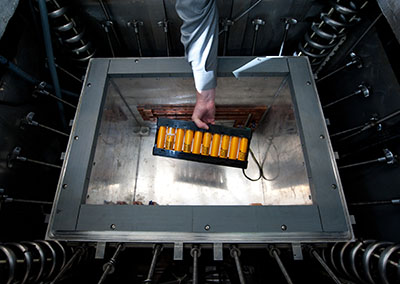NREL Issued Patent for Award-Winning Isothermal Battery Calorimeters

The National Renewable Energy Laboratory (NREL) was recently issued a patent for its R&D 100 Award-winning Isothermal Battery Calorimeters (IBCs). The multi-size IBCs were developed by energy storage engineers at NREL's Transportation and Hydrogen Systems Center, with funding from the U.S. Department of Energy's Vehicle Technologies Office, and licensed by NETZSCH North America for commercialization. NREL's IBCs are distinguished for their ability to perform precise thermal measurements needed to make safer, longer-lasting, and more cost-effective lithium-ion batteries for vehicles.
"Understanding and controlling temperature is vital for the successful operation of battery packs in electric-drive vehicles," said Matthew Keyser, acting group manager of NREL's energy storage team and contributing inventor of the IBCs. "The IBCs are unique in their ability to eliminate environmental variables, extend to a range of scales, and effectively assess the effects of temperature on vehicle battery systems while pinpointing ways to manage it."
High temperatures degrade batteries faster, while low temperatures decrease their power and capacity, affecting vehicle range, performance, and cost. In order for hybrids, plug-in hybrids, and all-electric vehicles to realize market penetration, vehicle batteries must operate at maximum efficiency, perform well under a wide range of driving conditions and climates, and do so through numerous charging cycles. Understanding how much heat is produced by batteries allows vehicle manufacturers to design cooling systems that enable batteries to operate within a temperature range that optimizes their lifespan and operational safety.
NREL's IBCs are the only calorimeters that can eliminate outside environmental variables by surrounding the test chamber on all six sides with isothermal bath fluid. The IBC design is based on isothermal heat-condition calorimetry, meaning that test samples of the fluid surrounding the battery are at the same initial and final temperatures.
Engineers applied key principles of thermodynamic, heat transfer, thermoelectric, and electrochemical theories in designing the IBCs to precisely measure heat from coin cells to small or large cells, modules, and battery packs. The Netzsch IBC 284 is the only instrument on the market capable of performing the detailed thermal characterization required for preventing extreme temperatures from having a detrimental impact on the performance, safety, and lifespan of electric-drive vehicle batteries.
NREL and NETZSCH engineers were among the winners of the 2013 R&D 100 Awards, known in the research and development community as the "Oscars of innovation," for developing the IBCs. The technology has been purchased by universities, industry groups, and international research laboratories.
Last Updated May 28, 2025
